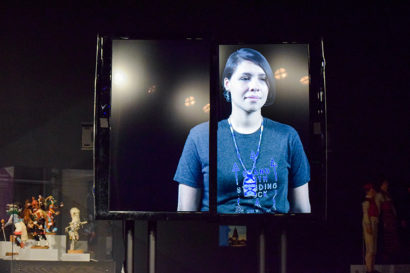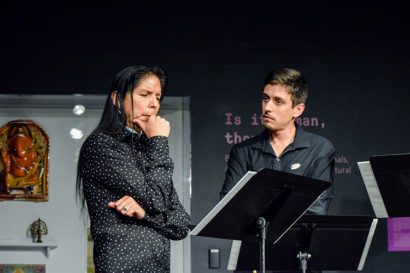Podcast: Native American Antigone explores universal values of honoring the dead
Associate professor Beth Piatote's first play, Antíkoni, was performed in the Hearst Museum of Anthropology this month
November 20, 2018
In the summer of 1996, Will Thomas and Dave Deacy were wading in the Columbia River in Kennewick, Washington, watching the annual hydroplane races. Thomas kicked something with his foot, bent down and pulled something up. It was a human skull. Turns out, it was a really old skull — 9,000 years old, one of the oldest human remains found in North America.
It’s a discovery that would fuel an ongoing debate between scientists and Native Americans about how ancestral remains should be treated.
It also inspired Beth Piatote, an associate professor of Native American studies at UC Berkeley and a member of the Nez Perce tribe, to write the play Antíkoni — a Native American version of the Greek tragedy Antigone.
Subscribe to the Fiat Vox podcast.
Find all episodes on Berkeley News.

Beth Piatote is an associate professor of Native American studies at UC Berkeley and the playwright of Antíkoni, a Native American version of the Greek tragedy, Antigone. (UC Berkeley photo by Anne Brice)
Following is a written version of Fiat Vox episode #45: “Native American Antigone explores universal values of honoring the dead:”
In the summer of 1996, Will Thomas and Dave Deacy were wading in the Columbia River in Kennewick, Washington, watching the annual hydroplane races. Will kicked something with his foot, bent down and pulled something up. It was a human skull.
[Music: “Ultima Thule” by Blue Dot Sessions]
Turns out, it was a really old skull — 9,000 years old, one of the oldest human remains found in North America.
It’s a discovery that would fuel an ongoing debate between scientists and Native Americans about how ancestral remains should be treated.
It also inspired Beth Piatote, an associate professor of Native American studies at UC Berkeley and a member of the Nez Perce tribe, to write the play Antíkoni. It’s a Native American version of the Greek tragedy Antigone.
“The question that was with me is like, ‘Why can people understand these concepts of universal literature, like Antigone, that’s supposed to deal with these universal problems of the living and the dead. What are the limits of the state? What are eternal laws v. human laws?'” says Piatote. “‘Why can the same people who can understand that great classic literature, not understand how native people feel about ancestral remains?’”

Fantasia Painter, a Ph.D. student in ethnic studies at UC Berkeley, plays Antíkoni. (UC Berkeley photo by Irene Yi)
Here’s a really quick overview of Antigone:
Written in 441 B.C. by Sophocles, the play is set in the aftermath of a civil war. Two sons of King Oedipus, Eteocles and Polynices, kill each other. The king’s successor, his brother Creon, believes that his nephew Polynices was a traitor and refuses to give him a proper burial.
But Polynices’s sister, Antigone, is determined to follow the law of the gods and bury her brother’s body. So, she defies Creon, buries Polynices’s body, and is caught and put in prison, where she kills herself.
“And that feeling that she feels for her brother is what native people feel for their ancestors,” says Piatote. “We care for them too. We care for them and we want to do what’s right even though the colonial order in which we are born, in which we exist, is trying to sever that relationship, trying to force us into different kind of postures.
It is a human experience to want the dead to rest properly, and the play was a way of talking about how holding the dead is also holding captive the living.”
Antíkoni was staged this month at Berkeley’s Hearst Museum of Anthropology, which holds one of the largest collections of Native American human remains and cultural items, second to the Smithsonian.

Inés Hernandez-Avila, a professor of Native American Studies at UC Davis, plays Auntie 1. (UC Berkeley photo by Irene Yi)
Piatote says that often in science, researchers see these human remains as an opportunity to study how people lived, to learn about their societies. But for Native Americans, their people’s ancestral remains mean something much different to them.
“It’s an entirely different system, an entirely different way of relating to these beings,” she says. “Native people would say, ‘Well, these are our ancestors who were buried in our ancestral homelands in these particular ways and they deserve to rest.’
So being here on campus and thinking about the very specific context here and then being able to actually stage the play in the museum… I think all those things were just really fantastic opportunities to confront this problem of what it is to be human.”
[Music: “Thule Racer” by Blue Dot Sessions]
The Native American Graves Protection and Repatriation Act, known as NAGPRA, was passed in 1990. The act requires that federal agencies and institutions that receive federal funding, like UC Berkeley, return certain Native American human remains and cultural objects to lineal descendants and culturally affiliated Indian tribes and Native Hawaiian organizations.

Phillip Cash Cash (left), who is Cayuse and Nez Perce and has a Ph.D. in anthropology and linguistics from the University of Arizona, plays Kreon. Benjamin Arsenault, an undergraduate student in theater, dance and performance studies at Berkeley, plays a guard. (UC Berkeley photo by Irene Yi)
Piatote recently joined Berkeley’s NAGPRA advisory committee, made up of a diverse group on campus who provide advice consistent with UC policy, its principles of community for diversity and inclusion and in compliance with federal laws.
“I think that people do understand the importance of repatriating remains to families and to proper resting places. So, the play was one way of trying to put to use to use something like the Greeks, the Greek universal, and say well, ‘What are the limits of your universal values?’ And also, to turn back and say, ‘It’s about all of our humanity to treat the dead properly.’”
Antíkoni was produced in collaboration with the Department of Theater, Dance and Performance Studies. It’s part of the department’s ongoing effort, led by graduate student working groups, to deepen conversation among native indigenous communities on campus and acknowledge indigenous art making.
Jennif(f)er Tamayo, who directed Antíkoni, is a second-year graduate student in theater, dance and performance studies. As part of her research, she’s studying how cultures have used spoken poetry to understand history.

Antíkoni director Jennif(f)er Tamayo (left), a second-year graduate student in theater, dance and performance studies, and associate professor and playwright Beth Piatote, speak on a panel about the making of Antíkoni as part of TDPS’s speaker series. (UC Berkeley photo by Irene Yi)
She says directing a diverse cast made up of graduate students and undergraduates, some of whom had never acted, plus native people from outside the campus community, made it especially important to her that everyone felt that they could bring their whole selves into their performances.
“One of the things I really wanted to ensure happened was that the ways in which we did the work together was done with care and that it was a priority over almost anything else,” says Tamayo.
“For Beth, one of the things that she talked about early on was that this was also to be a healing experience for those who had been a part of the play, cast members who were native, and also those ancestors who were held in the Hearst who we wanted to make sure remembered that we were still fighting for them.”
[Music: “Quiet Still” by Blue Dot Sessions]
Antíkoni will be part of a collection written by Piatote called The Beadworkers: Stories to be published in fall 2019 by Counterpoint Press.
At Berkeley, Antíkoni is already on syllabi in the classics and rhetoric departments, as well as Native American Studies and theater, dance and performance studies. This year, it’s also on syllabi in the classics departments at Stanford and Harvard.
And the 9,000-year-old skull — and skeleton — that were discovered more than 20 years ago, were finally returned last year to the Native tribes of the region where they were found. The tribes were able to give their ancestor — whom they call the Ancient One — a quiet burial in his homeland.